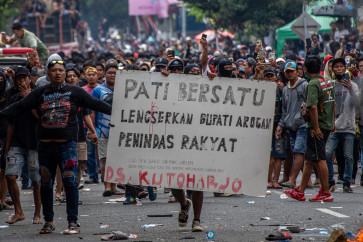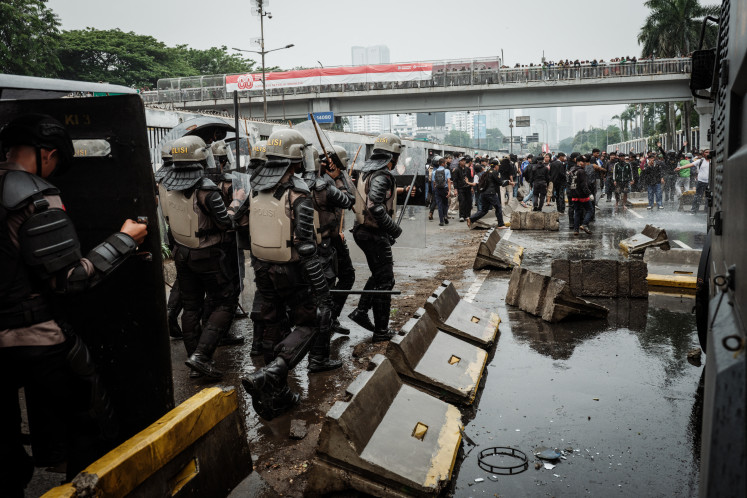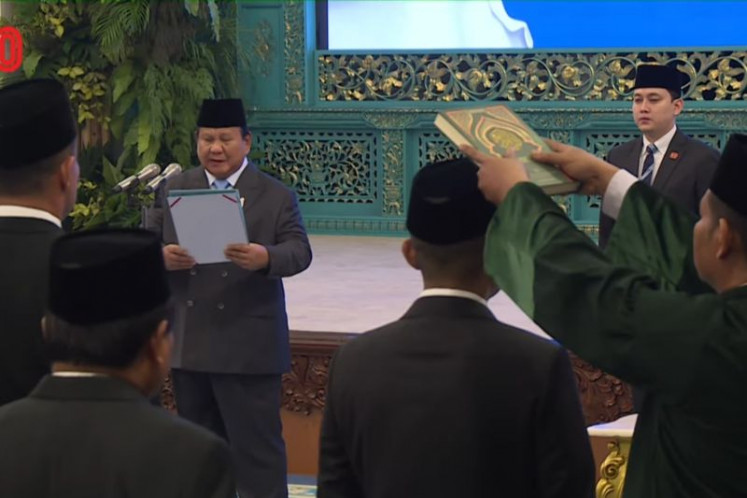Popular Reads
Top Results
Can't find what you're looking for?
View all search resultsPopular Reads
Top Results
Can't find what you're looking for?
View all search resultsEditorial: An unrealistic ban on maids
Manpower Minister Hanif Dhakiri announced on Monday that the government would stop the placement of migrant workers in 21 countries of the Middle East, so far among the top destinations of Indonesian workers, excluding those who are already on contract and working in those countries
Change text size
Gift Premium Articles
to Anyone
M
anpower Minister Hanif Dhakiri announced on Monday that the government would stop the placement of migrant workers in 21 countries of the Middle East, so far among the top destinations of Indonesian workers, excluding those who are already on contract and working in those countries.
He said the policy was part of a road map to end the placement of domestic workers overseas, and that stopping the deployment of maids to the Middle East was because regulating their protection had been ineffective.
He added that the sending and placing of Indonesian migrant workers to the Middle East would be banned and would thus constitute a trafficking crime if carried out. The ineffective protection of domestic workers, mostly women, had led to many abuses, he said, apart from a low wage level of up to Rp 3 million (US$229.79), 'which is lower than the minimum wage of Bekasi', the industrial area east of Jakarta, which is Rp 3.2 million.
The minister's announcement is in line with that of President Joko 'Jokowi' Widodo, who has said that the deployment of domestic workers should be stopped because of many problems in their working conditions, which 'embarrassed' him when meeting with leaders in Malaysia.
The imminent ban on sending maids to the Middle East, Hanif said, was triggered by the recent executions of two domestic workers in Saudi Arabia.
Advocates of migrant workers are protesting against the 'potential violation of women's rights to work'. They also refer to earlier policies to phase out the deployment of maids, which failed owing to the demand in the Middle East for Indonesian domestic workers.
Policies restricting migrant workers from Indonesia have indeed been ineffective, partially due to the demand for domestic worker and also because of poverty and unemployment in the country.
Minister Hanif echoed earlier pledges on alternatives to domestic workers overseas: better wages and better work at home. But the indications are far from promising that Hanif's plan could fare better than those of his predecessors. As a village head in Sumbawa, West Nusa Tenggara, told this newspaper, the village largely depends on the employment of migrant workers mainly in the Middle East.
The minister has said he 'fully understands' the conditions faced by migrant workers, as his mother once worked in Saudi Arabia. Thus, it is surprising that he has easily taken a short-cut policy to banning Indonesian maids from working in the Middle East, if he understands that such an option is taken because villagers see it as the best available amid opportunities at home.
The minister rightly cited the vulnerability of women to abuse in the private space of employers, but it is the task of the state to facilitate the right of citizens to work while constantly working to improve their protection.
A moratorium would be the better option instead of banning people working anywhere. Labor agencies with decades of experience in the Middle East could easily continue to recruit workers illegally, making our migrant workers even more prone to abuse.










